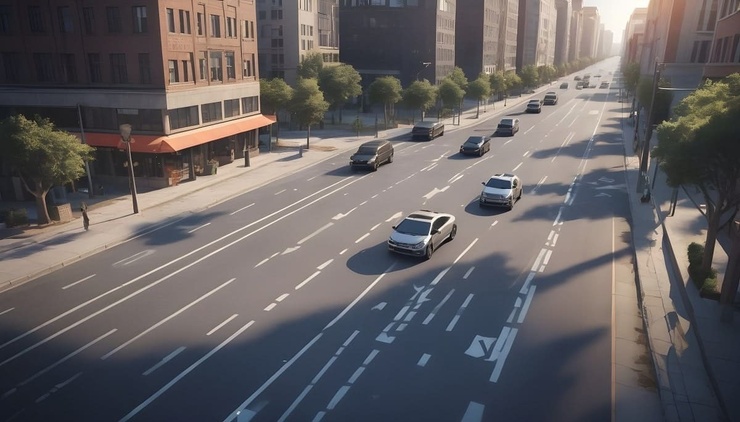- Sustainability
The Impact of Transport Scheduling Software on Fuel Savings and Environmental Sustainability
Table of Contents

Transport scheduling software has emerged as a crucial innovation in the logistics sector, especially as fuel costs and environmental concerns dominate global discourse. According to a report, 23% of global greenhouse gas emissions come from transportation. This highlights the urgent need for more sustainable solutions within the industry. By optimizing routes, reducing fuel consumption, and improving overall efficiency, scheduling software for transportation plays a key role in mitigating these environmental impacts.

With fuel prices surging, logistics businesses face increasing pressure to optimize their operations for cost efficiency and environmental sustainability. The global fuel energy price index stood at 177.39 index points in November 2024, further emphasizing the need for cost-effective solutions. By adopting advanced technologies like transport routing software, organizations can not only reduce operational expenses but also significantly minimize their carbon footprint.
What is Transport Scheduling Software?
Transport scheduling software is a comprehensive digital tool designed to optimize the planning, assignment, and management of vehicle routes and schedules. By leveraging advanced technologies such as Artificial Intelligence (AI), Machine Learning (ML), and real-time data analytics, it ensures both efficient and eco-friendly transportation management.
The software offers several key features that help businesses enhance operational efficiency while reducing their environmental impact. Dynamic route optimization identifies the most efficient paths based on real-time traffic, weather, and road conditions, ensuring timely deliveries. Fuel efficiency tracking monitors vehicle fuel consumption and provides actionable insights to reduce wastage, further driving cost savings.
Driver rostering balances workloads and ensures compliance with Hours of Service (HOS) regulations, promoting safety and productivity. Additionally, the software accommodates multi-constraint management, taking into account vehicle-specific limitations, delivery windows, and load capacities. Seamlessly integrating with fleet management systems, IoT devices, and telematics, transportation route planning software creates a smooth and coordinated operation.
Ultimately, this technology isn't just about improving efficiency—it's about finding the right balance between operational excellence and sustainability, helping businesses reduce their carbon footprint while maintaining high performance.
Challenges in Achieving Fuel Savings and Sustainability
Despite significant technological advancements, logistics businesses continue to face persistent challenges in reducing fuel consumption and achieving environmental sustainability goals. These hurdles, if left unaddressed, can hinder efforts to improve operational efficiency and meet regulatory standards.
- Inefficient Route Planning
Poorly optimized routes result in unnecessary fuel consumption, increased travel time, and higher operational costs. Failing to consider real-time factors such as traffic congestion and adverse weather conditions leads to suboptimal routing, exacerbating inefficiencies. - Lack of Visibility
Limited insight into fleet performance and fuel usage complicates efforts to detect inefficiencies and implement corrective measures. Without detailed tracking and analytics, businesses struggle to identify areas for improvement and optimize fuel efficiency effectively. - Complex Fleet Composition
Managing a fleet comprising various vehicle types, such as electric vehicles (EVs), vans, and trucks, introduces logistical challenges in scheduling and optimizing fuel consumption across different models with varying fuel requirements. - Regulatory Pressure
Stricter emissions regulations, such as those mandated by the EPA, require logistics companies to reduce their carbon footprint. However, these regulations often lack comprehensive guidelines or sufficient support, making compliance difficult for many businesses.
How FarEye’s Transport Scheduling Software Provides Solutions
FarEye’s transport scheduling software offers tailored solutions to tackle the challenges mentioned above. Here’s how it ensures fuel savings and fosters environmental sustainability:
- Real-time Route Optimization
This technology adjusts in real time to factors like traffic updates, weather conditions, and road closures, ensuring that routes are continuously optimized. Recalculating paths based on the latest data helps vehicles take the most efficient routes, reducing unnecessary mileage. This leads to potential fuel savings, lower costs, and a smaller environmental impact. Additionally, transportation routing software improves delivery timelines and boosts customer satisfaction by minimizing delays. - Smart Vehicle Allocation
This system intelligently assigns the most appropriate vehicle for each journey based on a variety of factors, including the nature of the load, the distance to be covered, and fuel efficiency considerations. By optimally pairing tasks with the right vehicle, it maximizes the use of fuel-efficient models and integrates electric vehicles (EVs) where applicable. This not only ensures that fuel consumption is minimized but also supports the transition towards a greener, more sustainable fleet composition. - Multi-constraint Planning
Advanced algorithms within this solution consider over 100 variables in the planning process, such as vehicle capacity, delivery sequence, time windows, and environmental restrictions, including low-emission zones. This multi-constraint approach ensures that logistics operations are not only optimized for fuel efficiency but also comply with regulatory requirements and minimize environmental impact. It allows businesses to streamline operations without compromising on legal compliance or service quality. - Eco-driven Analytics
Dynamic slot selection and green delivery windows optimize routes for cost efficiency and sustainability. By offering real-time delivery options during checkout, businesses can encourage customers to choose low-cost, eco-friendly slots. This reduces delivery costs, enhances customer satisfaction, and supports sustainability goals. Comprehensive reporting helps track fuel savings and carbon reductions, fostering a balance between profitability and environmental responsibility.
By adopting FarEye's routing solutions, businesses can significantly enhance operational performance, reduce environmental impact, and contribute to a more sustainable logistics ecosystem, driving long-term value for both their bottom line and the planet.
The Ripple Effect: Fuel Savings and Environmental Sustainability
FarEye’s transport scheduling software provides a comprehensive solution for improving fuel efficiency through several key strategies:
- Minimized CO₂ Emissions
By optimizing transportation routes and improving fuel efficiency, FarEye helps businesses reduce CO₂ emissions. This helps businesses align with global sustainability goals and regulatory standards. - Support for Electric Vehicles (EVs)
FarEye actively encourages the adoption of electric vehicles (EVs), promoting a transition to greener logistics solutions. EVs play a critical role in reducing the environmental impact of transportation and are integral to green logistics strategies. - Reduced Fuel Dependency
Optimization of operations and the encouragement of EV integration significantly reduce reliance on traditional fuel sources. This lowers the environmental impact of logistics, contributing to a more sustainable transportation network.
Gaining a Competitive Edge with Transport Scheduling Software
Transport scheduling software is no longer a luxury but a necessity in modern logistics. It addresses critical challenges like inefficient routing and regulatory compliance while delivering tangible benefits in fuel savings and environmental sustainability. By leveraging features like real-time analytics, dynamic optimization, and eco-focused planning, businesses can transform their logistics operations into a competitive advantage.
As the world moves towards greener logistics practices, FarEye’s transport scheduling software empowers organizations to achieve their goals efficiently, responsibly, and profitably. Whether it’s reducing operational costs, enhancing customer satisfaction, or meeting sustainability objectives, this technology is the cornerstone of future-ready logistics.

Komal Puri is a seasoned professional in the logistics and supply chain industry. As the AVP of Marketing and a subject matter expert at FarEye, she has been instrumental in shaping the industry narrative for the past decade. Her expertise and insights have earned her numerous awards and recognition. Komal’s writings reflect her deep understanding of the industry, offering valuable insights and thought leadership.
Let's Talk to Our Experts and Optimize Your Deliveries Today!
An expert from our team will reach out within 24 hours


